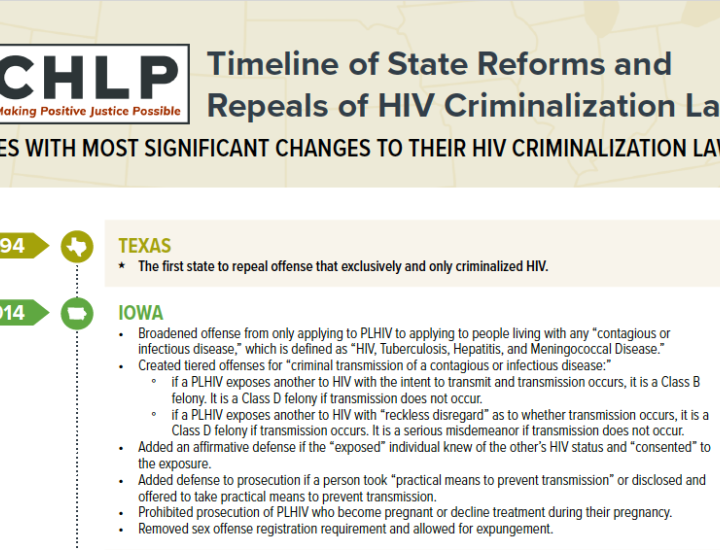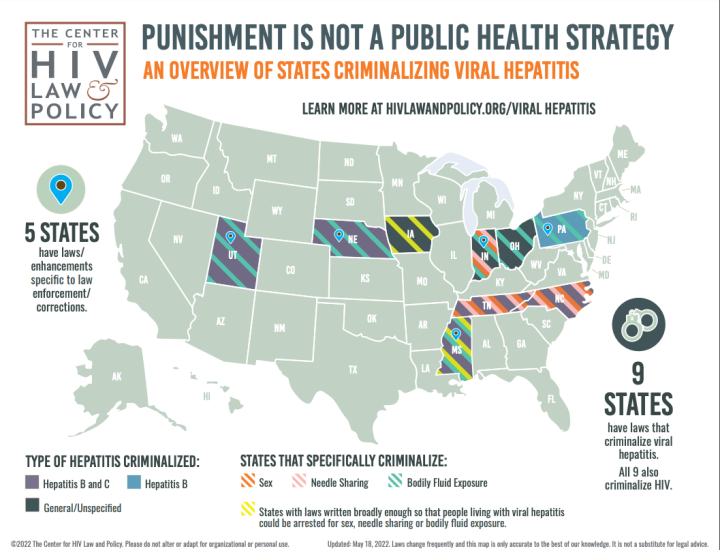
While we have made an effort to ensure that this information is correct and current, the law is regularly changing, and we cannot guarantee the accuracy of the information provided. This information may not be applicable to your specific situation and is not, and should not be relied upon, as a substitute for legal advice.
HIV-Specific Criminal Laws
North Carolina has HIV-specific criminal statutes.
People living with HIV (PLHIV) or hepatitis B or C must disclose their status to sexual partners under many circumstances and are required to take risk reduction measures during sex. Violations of these requirements can result in misdemeanor charges.
Although North Carolina's HIV-specific law is a misdemeanor, the punishment is up to two years, which is greater than the maximum for a misdemeanor offense in most states.
PLHIV or hepatitis B or C may face criminal penalties for sharing needles.
PLHIV or hepatitis B or C are prohibited from donating blood or blood products, organs, human tissue, semen, ova, or breast milk except under specific circumstances.
Persons with a sexually transmitted infection (STI) are subject to a range of public health control measures and violation may result in misdemeanor charges. These are different from the control measures for HIV, hepatitis B and C.
PLHIV may also be prosecuted under general criminal laws such as assault or reckless endangerment.
Violation of North Carolina's HIV-specific health code section is a misdemeanor that can result in up to two years incarceration.
State Guidelines on Health Care Workers with HIV
We currently are in the process of reviewing and updating our resources and summaries related to health care workers and disclosure. In the meantime, please do not rely on this information as current, and get in touch with CHLP with any questions.
Voluntary testing.
Expert panel will make recommendations regarding the identification of patients that have been exposed to a significant risk.
All HIV+ HCWs who perform surgical or obstetrical procedures or dental procedures shall notify the State Health Director (SHD). The SHD shall investigate the practice of any infected HCW and the risk of transmission to patients. If the SHD determines that there may be a significant risk of transmission patients, the SHD shall appoint an expert panel to evaluate the risk of transmission to patients, and review the practice, skills, and clinical condition of the infected HCW, as well as the nature of the surgical or obstetrical procedures or dental procedures performed and operative and infection control techniques used. The panel shall make recommendations to the SHD that address restrictions that are necessary to prevent transmission to patients, identification of patients that have been exposed to a significant risk of transmission and periodic review of the clinical condition and practice of the infected HCW. If, prior to receipt of the recommendations of the expert panel, the SHD determines that immediate practice restrictions are necessary to prevent an imminent threat to the public health, the SHD shall issue an isolation order.
Minors' Access to STI and HIV Testing and Treatment
These summaries highlight key aspects of state laws governing the rights of minors to consent to testing and/or treatment for sexually transmitted infections (STIs) and HIV. Any such summary cannot capture the details and nuances of individuals state laws. Although roughly a third of the states permit health care providers to inform a minor's parents that their child is seeking STI-related services, none require it. Also, the law is fluid, and these summaries may not reflect recent legislative change in a particular state.
Every state in the country allows minors to consent to STI testing and care without parental approval, although a number of these set an age threshold for the right to consent without parental involvement. In these states, the minimum age ranges from 12 to 14 years of age.
As of the date of this posting, thirty-one states allow minors to also consent to HIV testing and treatment without parental approval.
HIV Testing
Unlike testing for most other infectious diseases, testing for HIV involves possible benefits as well as social, economic, and legal consequences that typically are not apparent or known to an individual considering testing. HIV-related testing is the gateway to health-preserving treatment; it also can be the basis of criminal prosecution for those who are sexually active, or relied on to exclude individuals who test positive for HIV from programs, employment, or insurance. Although state and federal laws prohibit much of this discrimination against people with HIV, the ability to enforce those rights usually depends on access to free legal services, which are increasingly limited and not available at all in roughly half of the states in the United States. Thus, the potential negative consequences of HIV testing at a particular time or location might inform an individual's decision of whether or when to get tested for HIV; or whether to test anonymously or through a "confidential" testing process that reports their test results and identifying information to the state but maintains the confidentiality of those results.
The American Medical Association has long defined informed consent as a process of communication between a patient and physician that results in the patient's authorization or agreement to undergo a specific medical intervention. Although informed consent is a legal concept rather than a medical one, many states use definitions of "informed consent" for purposes of HIV testing and medical procedures that in fact are inconsistent with the accepted legal definition, e.g., they do not require that an individual receive information or sometimes even notification that they are about to be tested for HIV. The Center for HIV Law and Policy (CHLP) accepts the legal and court-affirmed definition of informed consent; therefore, state protocols that call for "opt-out" testing (a patient is tested for HIV unless she/he objects) or that mirror general consent approaches are not counted as "informed consent" laws even in those instances where the state legislature has characterized their state law as requiring "informed consent." In short, CHLP does not consider or count laws that allow a patient's silence or general consent as granting authority to do confidential HIV testing as informed consent laws.
Post-test counseling with referrals for medical and psychosocial services for persons with HIV required; local health departments must offer free counseling.
Post-test counseling with referrals for medical and psychosocial services for persons infected with HIV required; local health departments must offer free counseling.
Notification to sexual intercourse and needle partners of possible HIV exposure is required.
Find the laws in a different state.
Copyright Information: CHLP encourages the broad use and sharing of resources. Please credit CHLP when using these materials or their content. and do not alter, adapt or present as your work without prior permission from CHLP.
Legal Disclaimer: CHLP makes an effort to ensure legal information is correct and current, but the law is regularly changing, and the accuracy of the information provided cannot be guaranteed. The legal information in a given resource may not be applicable to all situations and is not—and should not be relied upon—as a substitute for legal advice.

